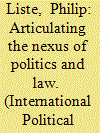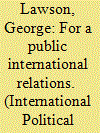|
|
|
Sort Order |
|
|
|
Items / Page
|
|
|
|
|
|
|
| Srl | Item |
| 1 |
ID:
081360


|
|
|
|
|
| Publication |
2008.
|
| Summary/Abstract |
Does law rule foreign affairs in the democratic state? Basically, one might expect that democratic executives operate on the ground of what is called the Rechtsstaat, and that in a political system with checks and balances operations-especially those eventually dropping out of that ground-are subject to judicial review. However, legal systems are more often than not willing to abstain from a legal governance of its countries' foreign policy-because of "political reasons." Moreover, democracies obviously vary according to their legal operations. At least in the area of foreign affairs, the relationship of democracy and law does not take up a necessary character. Facing this contingency, the article engages in the discursive construction of a politics and law nexus in the course of the operations of two legal systems, in the United States and Germany. For that reason, it will proceed by deconstructing two legal decisions related to the war in Iraq. Building upon the premise that legal practices are intertwined into a larger web of (legal) text, the article argues that the possibility of a judicial abstention in cases bearing reference to foreign policy issues depends on meaning produced in the course of the signification and positioning of discursive elements like "politics" and "law." Thus, speaking law is a politico-legal practice
|
|
|
|
|
|
|
|
|
|
|
|
|
|
|
|
| 2 |
ID:
081359


|
|
|
|
|
| Publication |
2008.
|
| Summary/Abstract |
The last few years have seen an opening up of what is considered to be the legitimate terrain of international relations (IR). This move is, for the most part, extremely welcome. Yet, the multiple theoretical and empirical openings in IR since the end of the Cold War have failed to elucidate many of the puzzles, questions and problems posed by the contemporary conjuncture. There are a number of reasons for this failure ranging from the stickiness of Cold War problem fields to IR's continued attachment to systemic-level theories. However, this article focuses less on symptoms than on treatment and, in particular, on how generating a more "public" international relations enterprise might help to connect IR with the core theoretical, empirical and normative terrain of "actually existing" world politics. Taking its cue from recent debates in sociology about how to generate a "public sociology," the article lays out three pathologies that a public IR enterprise should avoid and four ground rules-amounting to a manifesto of sorts-which sustain the case for a "public" international relations
|
|
|
|
|
|
|
|
|
|
|
|
|
|
|
|
| 3 |
ID:
081361


|
|
|
|
|
| Publication |
2008.
|
| Summary/Abstract |
This article examines the workings and effects of the penalization of poverty in urban Brazil at century's turn to uncover the deep logic of punitive containment as state strategy for the management of dispossessed and dishonored populations in the polarizing city in the age of triumphant neoliberalism. It shows how ramifying criminal violence (fed by extreme inequality and mass poverty), class and color discrimination in judicial processing, unchecked police brutality, and the catastrophic condition and chaotic operation of the carceral system combine to make the aggressive deployment of the penal apparatus in Brazil a surefire recipe for further disorder and disrespect for the law at the bottom of the urban hierarchy and steers the country into an institutional impasse. The policy of punitive containment pursued by political elites as a complement to the deregulation of the economy in the 1990s leads from the penalization to the militarization of urban marginality, under which residents of the declining favelas are treated as virtual enemies of the nation, tenuous trust in public institutions is undermined, and the spiral of violence accelerated. Brazil thus serves as a historical revelator of the full consequences of the penal disposal of the human detritus of a society swamped by social and physical insecurity. Drawing parallels between penal activity in the Brazilian and the U.S. metropolis further reveals that the neighborhoods of urban relegation wherein the marginal and stigmatized fractions of the postindustrial working class concentrate are the prime targets and proving ground upon which the neoliberal penal state is concretely being assembled, tried, and tested. Their study is therefore of urgent interest to analysts of international politics and state power at the dawn of the twenty-first century
|
|
|
|
|
|
|
|
|
|
|
|
|
|
|
|
| 4 |
ID:
081358


|
|
|
|
|
| Publication |
2008.
|
| Summary/Abstract |
In recent decades, scholars in the field of international relations (IR) have increasingly paid attention to issues of religion-often linked to "civilizational" and "cultural" identities. The IR field at large unconsciously assumes, however, that there is a "secular" "norm" against which the "religious" dimensions of IR can be analyzed or compared. Western IR scholars often take the "secular" for granted, rarely considering how the boundaries of the "secular" are defined and deployed in scholarship and policy. Building on decades of debate over "secularization theory" by sociologists of religion examination of secularist assumptions in IR theory, this article suggests that defining secularism as a political negotiation over the accepted role of religion in public life rather than as an a priori category has methodological and theoretical consequences to which IR scholars and policy makers, particularly those interested in issues of democratization and religious fundamentalism should pay attention. Using illustrations from the Middle East-a current focal point for debate on both democratization and religious fundamentalism-this article builds on the secularization debate to suggest that IR scholarship treating the "secular" and "religious" as opposing categories obscures more than it explains in terms of analyzing the role of religion in contemporary Middle Eastern politics
|
|
|
|
|
|
|
|
|
|
|
|
|
|
|
|
|
|
|
|
|